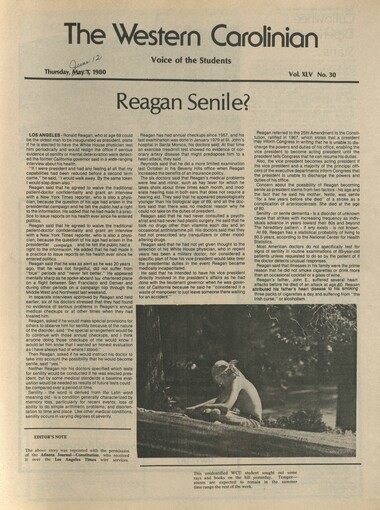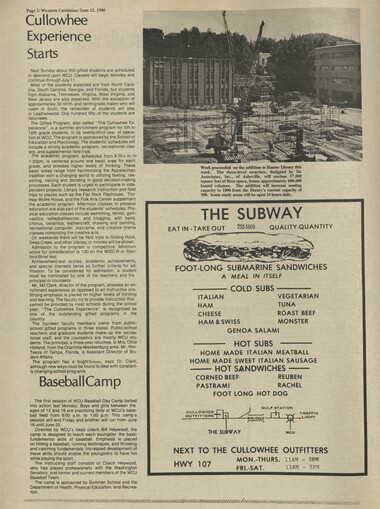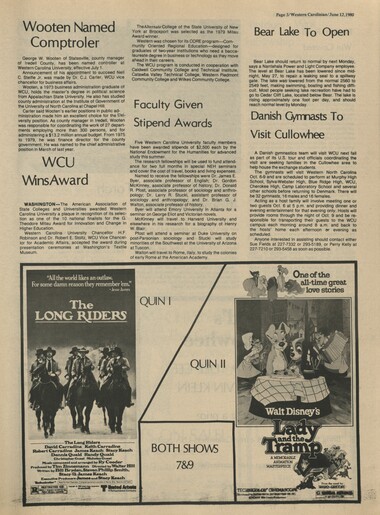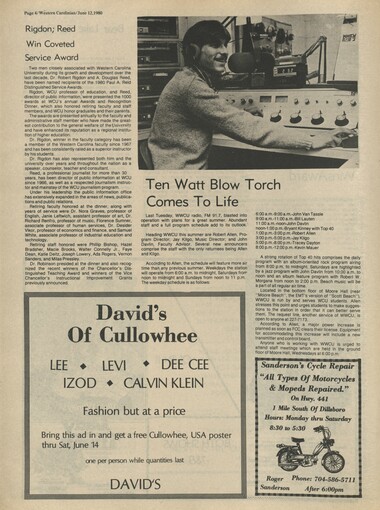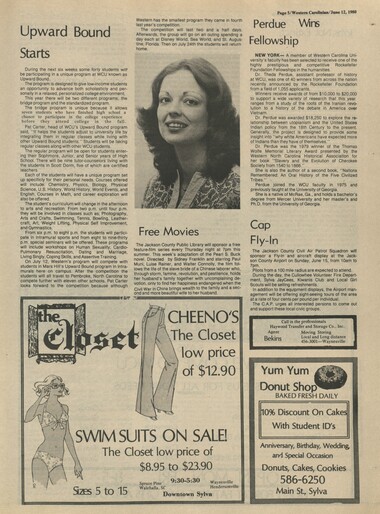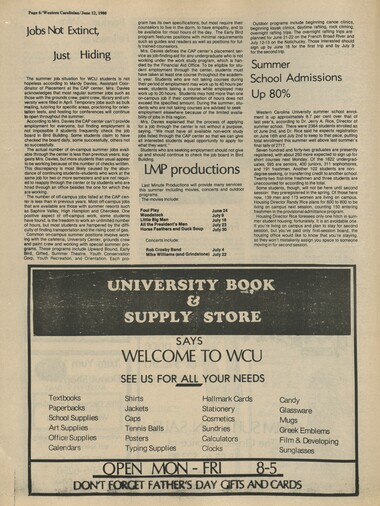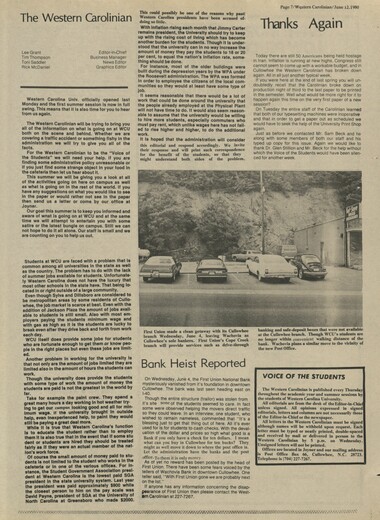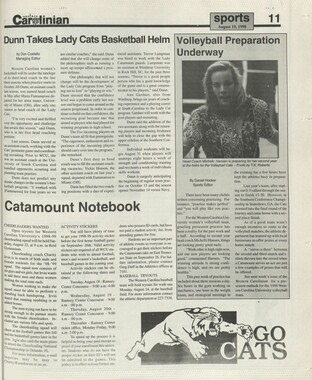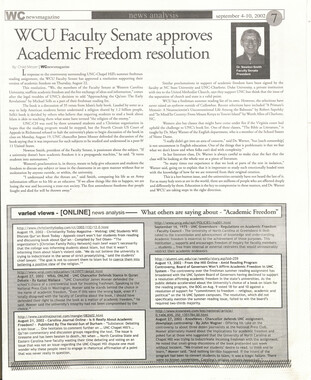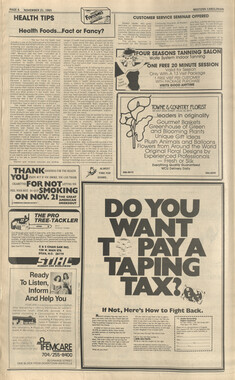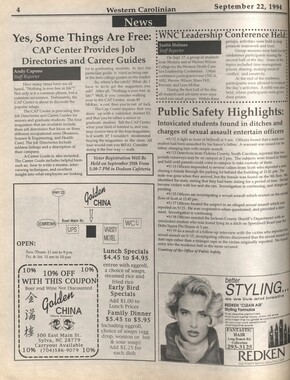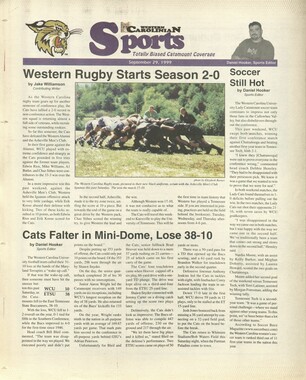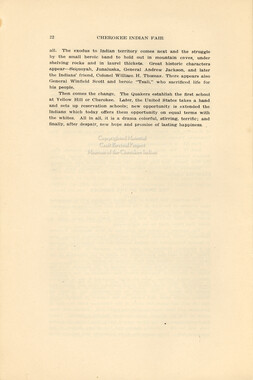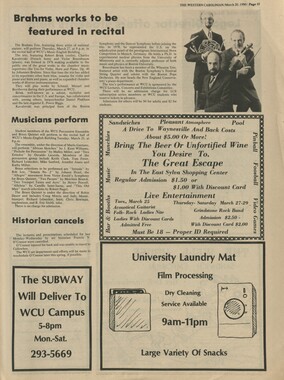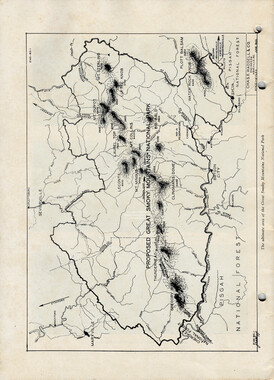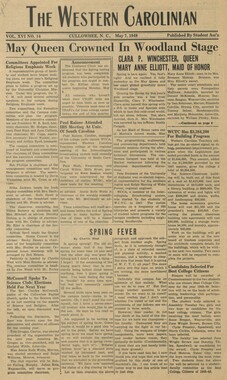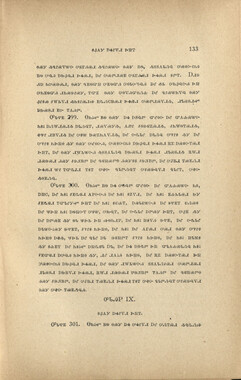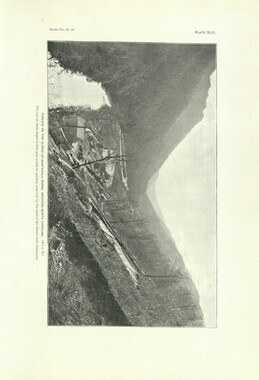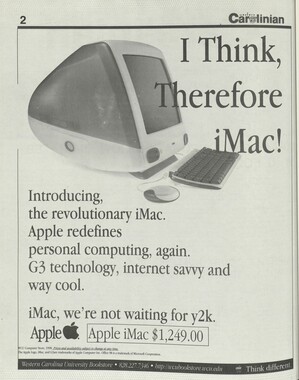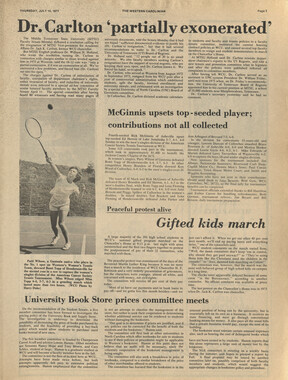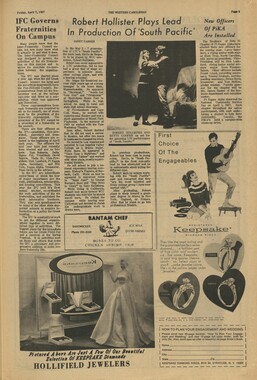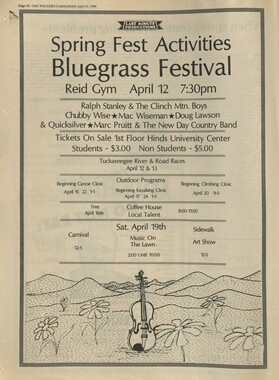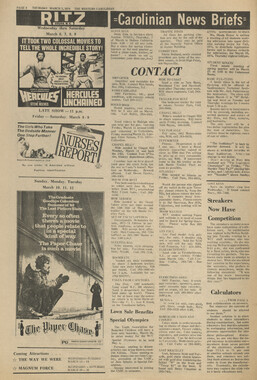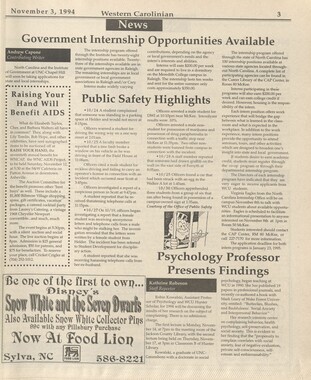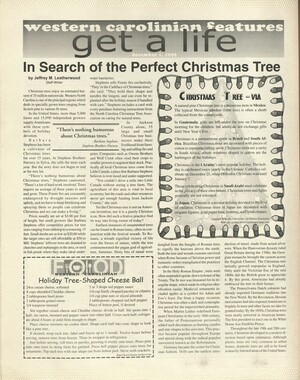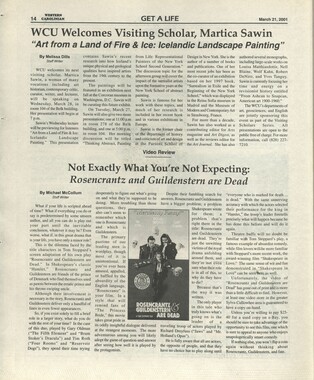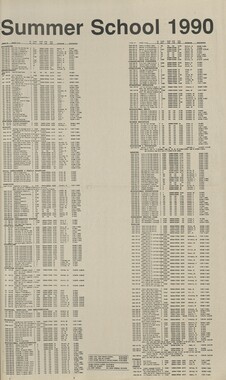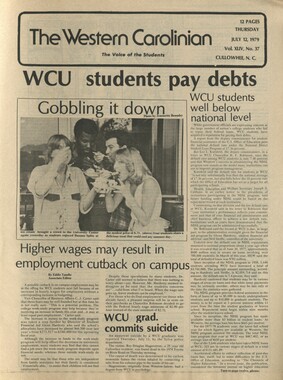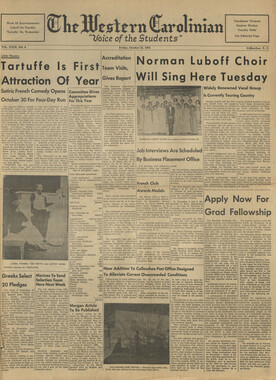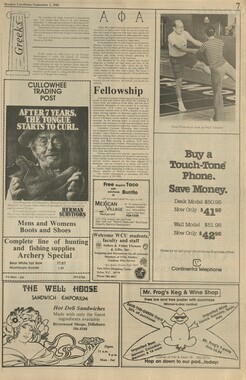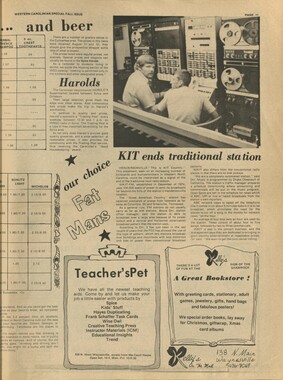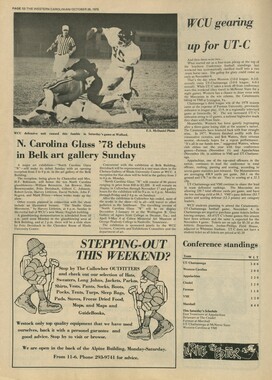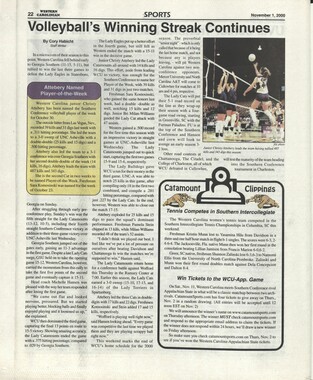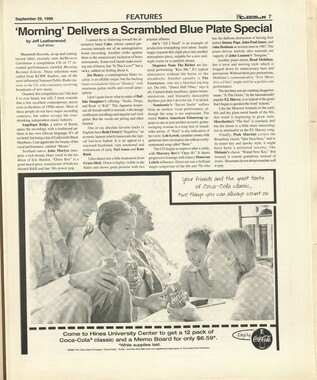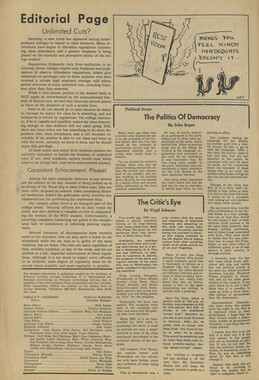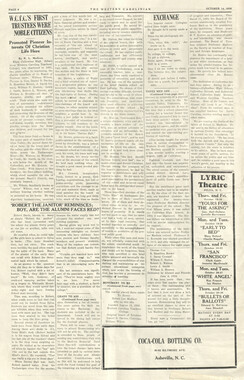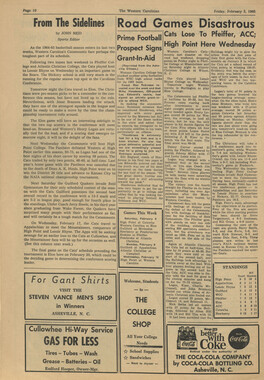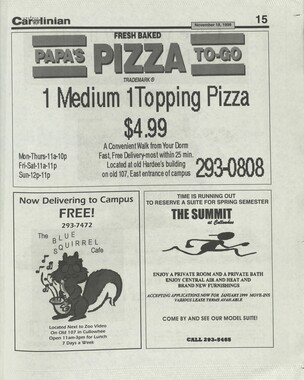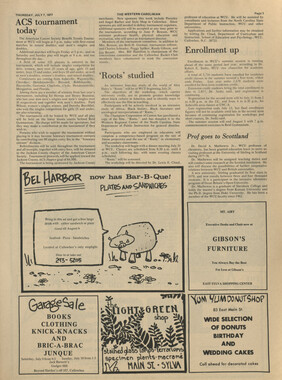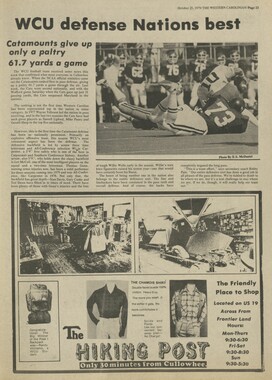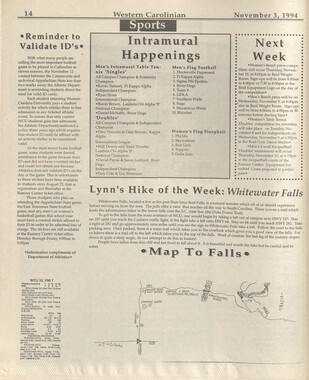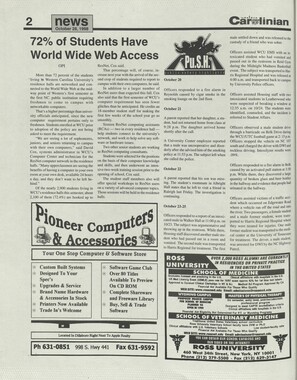Western Carolina University (20)
View all
- Canton Champion Fibre Company (2308)
- Cherokee Traditions (292)
- Civil War in Southern Appalachia (165)
- Craft Revival (1942)
- Great Smoky Mountains - A Park for America (2766)
- Highlights from Western Carolina University (430)
- Horace Kephart (941)
- Journeys Through Jackson (154)
- LGBTQIA+ Archive of Jackson County (85)
- Oral Histories of Western North Carolina (314)
- Picturing Appalachia (6772)
- Stories of Mountain Folk (413)
- Travel Western North Carolina (160)
- Western Carolina University Fine Art Museum Vitreograph Collection (129)
- Western Carolina University Herbarium (92)
- Western Carolina University: Making Memories (708)
- Western Carolina University Publications (2283)
- Western Carolina University Restricted Electronic Theses and Dissertations (146)
- Western North Carolina Regional Maps (71)
- World War II in Southern Appalachia (131)
University of North Carolina Asheville (6)
View all
- Allanstand Cottage Industries (62)
- Appalachian National Park Association (53)
- Bennett, Kelly, 1890-1974 (1388)
- Berry, Walter (76)
- Brasstown Carvers (40)
- Carver, George Washington, 1864?-1943 (26)
- Cathey, Joseph, 1803-1874 (1)
- Champion Fibre Company (233)
- Champion Paper and Fibre Company (297)
- Cherokee Indian Fair Association (16)
- Cherokee Language Program (22)
- Crowe, Amanda (40)
- Edmonston, Thomas Benton, 1842-1907 (7)
- Ensley, A. L. (Abraham Lincoln), 1865-1948 (275)
- Fromer, Irving Rhodes, 1913-1994 (70)
- George Butz (BFS 1907) (46)
- Goodrich, Frances Louisa (120)
- Grant, George Alexander, 1891-1964 (96)
- Heard, Marian Gladys (60)
- Kephart, Calvin, 1883-1969 (15)
- Kephart, Horace, 1862-1931 (313)
- Kephart, Laura, 1862-1954 (39)
- Laney, Gideon Thomas, 1889-1976 (439)
- Masa, George, 1881-1933 (61)
- McElhinney, William Julian, 1896-1953 (44)
- Niggli, Josephina, 1910-1983 (10)
- North Carolina Park Commission (105)
- Osborne, Kezia Stradley (9)
- Owens, Samuel Robert, 1918-1995 (11)
- Penland Weavers and Potters (36)
- Roberts, Vivienne (15)
- Roth, Albert, 1890-1974 (142)
- Schenck, Carl Alwin, 1868-1955 (1)
- Sherrill's Photography Studio (2565)
- Southern Highland Handicraft Guild (127)
- Southern Highlanders, Inc. (71)
- Stalcup, Jesse Bryson (46)
- Stearns, I. K. (213)
- Thompson, James Edward, 1880-1976 (226)
- United States. Indian Arts and Crafts Board (130)
- USFS (683)
- Vance, Zebulon Baird, 1830-1894 (1)
- Weaver, Zebulon, 1872-1948 (58)
- Western Carolina College (230)
- Western Carolina Teachers College (282)
- Western Carolina University (1794)
- Western Carolina University. Mountain Heritage Center (18)
- Whitman, Walt, 1819-1892 (10)
- Wilburn, Hiram Coleman, 1880-1967 (73)
- Williams, Isadora (3)
- Cain, Doreyl Ammons (0)
- Crittenden, Lorraine (0)
- Rhodes, Judy (0)
- Smith, Edward Clark (0)
- Appalachian Region, Southern (2569)
- Asheville (N.C.) (1923)
- Avery County (N.C.) (26)
- Blount County (Tenn.) (161)
- Buncombe County (N.C.) (1672)
- Cherokee County (N.C.) (283)
- Clay County (N.C.) (555)
- Graham County (N.C.) (233)
- Great Smoky Mountains National Park (N.C. and Tenn.) (519)
- Haywood County (N.C.) (3524)
- Henderson County (N.C.) (70)
- Jackson County (N.C.) (4694)
- Knox County (Tenn.) (25)
- Knoxville (Tenn.) (12)
- Lake Santeetlah (N.C.) (10)
- Macon County (N.C.) (420)
- Madison County (N.C.) (212)
- McDowell County (N.C.) (39)
- Mitchell County (N.C.) (132)
- Polk County (N.C.) (35)
- Qualla Boundary (981)
- Rutherford County (N.C.) (76)
- Swain County (N.C.) (2115)
- Transylvania County (N.C.) (270)
- Watauga County (N.C.) (12)
- Waynesville (N.C.) (84)
- Yancey County (N.C.) (72)
- Aerial Photographs (3)
- Aerial Views (60)
- Albums (books) (4)
- Articles (1)
- Artifacts (object Genre) (228)
- Bibliographies (1)
- Biography (general Genre) (2)
- Cards (information Artifacts) (38)
- Clippings (information Artifacts) (191)
- Crafts (art Genres) (622)
- Depictions (visual Works) (21)
- Design Drawings (1)
- Drawings (visual Works) (184)
- Envelopes (73)
- Facsimiles (reproductions) (1)
- Fiction (general Genre) (4)
- Financial Records (12)
- Fliers (printed Matter) (67)
- Glass Plate Negatives (381)
- Guidebooks (2)
- Internegatives (10)
- Interviews (815)
- Land Surveys (102)
- Letters (correspondence) (1013)
- Manuscripts (documents) (618)
- Maps (documents) (177)
- Memorandums (25)
- Minutes (administrative Records) (59)
- Negatives (photographs) (5835)
- Newsletters (1285)
- Newspapers (2)
- Occupation Currency (1)
- Paintings (visual Works) (1)
- Pen And Ink Drawings (1)
- Periodicals (193)
- Personal Narratives (10)
- Photographs (12976)
- Plans (maps) (1)
- Poetry (6)
- Portraits (4533)
- Postcards (329)
- Programs (documents) (151)
- Publications (documents) (2236)
- Questionnaires (65)
- Scrapbooks (282)
- Sheet Music (2)
- Slides (photographs) (402)
- Songs (musical Compositions) (2)
- Sound Recordings (796)
- Specimens (92)
- Speeches (documents) (15)
- Tintypes (photographs) (8)
- Transcripts (322)
- Video Recordings (physical Artifacts) (23)
- Vitreographs (129)
- Text Messages (0)
- A.L. Ensley Collection (275)
- Appalachian Industrial School Records (7)
- Appalachian National Park Association Records (336)
- Axley-Meroney Collection (2)
- Bayard Wootten Photograph Collection (20)
- Bethel Rural Community Organization Collection (7)
- Blumer Collection (5)
- C.W. Slagle Collection (20)
- Canton Area Historical Museum (2110)
- Carlos C. Campbell Collection (282)
- Cataloochee History Project (64)
- Cherokee Studies Collection (4)
- Daisy Dame Photograph Album (5)
- Daniel Boone VI Collection (1)
- Doris Ulmann Photograph Collection (112)
- Elizabeth H. Lasley Collection (1)
- Elizabeth Woolworth Szold Fleharty Collection (4)
- Frank Fry Collection (95)
- George Masa Collection (173)
- Gideon Laney Collection (452)
- Hazel Scarborough Collection (2)
- Hiram C. Wilburn Papers (28)
- Historic Photographs Collection (236)
- Horace Kephart Collection (861)
- Humbard Collection (33)
- Hunter and Weaver Families Collection (1)
- I. D. Blumenthal Collection (4)
- Isadora Williams Collection (4)
- Jesse Bryson Stalcup Collection (47)
- Jim Thompson Collection (224)
- John B. Battle Collection (7)
- John C. Campbell Folk School Records (80)
- John Parris Collection (6)
- Judaculla Rock project (2)
- Kelly Bennett Collection (1407)
- Love Family Papers (11)
- Major Wiley Parris Civil War Letters (3)
- Map Collection (12)
- McFee-Misemer Civil War Letters (34)
- Mountain Heritage Center Collection (4)
- Norburn - Robertson - Thomson Families Collection (44)
- Pauline Hood Collection (7)
- Pre-Guild Collection (2)
- Qualla Arts and Crafts Mutual Collection (12)
- R.A. Romanes Collection (681)
- Rosser H. Taylor Collection (1)
- Samuel Robert Owens Collection (94)
- Sara Madison Collection (144)
- Sherrill Studio Photo Collection (2558)
- Smoky Mountains Hiking Club Collection (616)
- Stories of Mountain Folk - Radio Programs (374)
- The Reporter, Western Carolina University (510)
- Venoy and Elizabeth Reed Collection (16)
- WCU Gender and Sexuality Oral History Project (32)
- WCU Mountain Heritage Center Oral Histories (25)
- WCU Oral History Collection - Mountain People, Mountain Lives (71)
- WCU Students Newspapers Collection (1744)
- Western North Carolina Tomorrow Black Oral History Project (69)
- William Williams Stringfield Collection (2)
- Zebulon Weaver Collection (109)
- African Americans (390)
- Appalachian Trail (35)
- Artisans (521)
- Cherokee art (84)
- Cherokee artists -- North Carolina (10)
- Cherokee language (21)
- Cherokee pottery (101)
- Cherokee women (208)
- Church buildings (170)
- Civilian Conservation Corps (U.S.) (110)
- College student newspapers and periodicals (1830)
- Dams (107)
- Dance (1023)
- Education (222)
- Floods (61)
- Folk music (1015)
- Forced removal, 1813-1903 (2)
- Forest conservation (220)
- Forests and forestry (1184)
- Gender nonconformity (4)
- Great Smoky Mountains National Park (N.C. and Tenn.) (181)
- Hunting (38)
- Landscape photography (25)
- Logging (118)
- Maps (83)
- Mines and mineral resources (8)
- North Carolina -- Maps (18)
- Paper industry (38)
- Postcards (255)
- Pottery (135)
- Railroad trains (71)
- Rural electrification -- North Carolina, Western (3)
- School integration -- Southern States (2)
- Segregation -- North Carolina, Western (5)
- Slavery (5)
- Sports (452)
- Storytelling (244)
- Waterfalls -- Great Smoky Mountains (N.C. and Tenn.) (66)
- Weaving -- Appalachian Region, Southern (280)
- Wood-carving -- Appalachian Region, Southern (328)
- World War, 1939-1945 (173)
Western Carolinian Volume 45 Number 30 (31)
Item
Item’s are ‘child’ level descriptions to ‘parent’ objects, (e.g. one page of a whole book).
-
-
The Vastern Carolinian cy1" Thursday, fitapt; 1980 Voice of the Students VoLXLV No. 30 Reagan Senile? LOS ANQELES ■ Ronald Reagan, who at age 69 could be the oldest man to be inaugurated as president, plans if he is elected to have the White House physician test him periodically and would resign the office if serious evidence of senility or mental deterioration were detected the former California governor said in a wide-ranging interview about his health. "If I were president and had any feeling at all that my capabilities had been reduced before a second term came," he said, "I would walk away. By the same token I would step down also." Reagan said that he agreed to waive the traditional, patient-doctor confidentiality and grant an interview with a New York Times reporter, who is also a physician, because the question of his age had arisen in the presidential campaign and he felt the public had a right to the information. He added that he had made it a practice to issue reports on his health ever since he entered politics. Reagan said that he agreed to waive the traditional patient-doctor confidentiality and grant an interview with a New York Times reporter, who is also a physician, because the question of his age had arisen in the presidential campaign i and he felt the public had a right to the information. He added that he had made it a practice to issue reports on his health ever since he entered politics. Reagan said that he was as alert as he was 20 years ago, that he was not forgetful, did not suffer from "blue" periods and "never felt better." He appeared mentally sharp as he spoke aboard his chartered plane on a flight between San Francisco and Denver and during other periods on a campaign trip through the Middle West and Northwest last weekend. In separate interviews approved by Reagan and held earlier, six of his doctors stressed that they had found no evidence of serious problems in Reagan's annual medical checkups or at other times when they had treated him. Reagan, asked if he would make special provisions for others to observe him for senility because of the nature of the disorder, said "the special arrangement would be to continue with those annual checkups, and I think anyone doing those checkups of me would know I would let him know that I wanted an honest evaluation as I have always had of where I stood." Then Reagan, asked if he would instruct his doctor to take into account the possibility that he would become senile, said "yes." Neither Reagan nor his doctors specified which tests for senility would be conducted if he was elected president, byt by some medical standards a baseline evaluation would be needed so results of future tests could be compared over a period of time. Senility - the word is derived from the Latin word meaning old - is a condition generally characterized by memory loss, particularly for recent events; loss of ability to do simple arithmetic problems, and disorientation to time and place. Like other medical conditions, senility occurs in varying degrees of severity. EDITOR'S NOTE The above story was reprinted with the permission of the Atlanta Journal—Constitution, who received it over the Los Angeles Times wire services. Reagan has had annual checkups since 1957, and his last examination was done in January 1979 at St. John's hospital in Santa Monica, his doctors said. At that time an exercise treadmill test showed no evidence of coronary artery disease that might predispose him to a heart attack, they said. Reynolds said that he did a more limited examination last October in his Beverly Hills office when Reagan increased the benefits of an insurance policy. The six doctors said that Reagan's medical problems were few and minor, such as hay fever for which he takes shots about three times each month, and moderate hearing loss in both ears that does not require a hearing aid. They said that he appeared psysiologically younger than his biological age of 69, and all the doctors said that there was.no medical reason why he could not take on the duties of president. Reagan said that he had never consulted a psychiatrist and had never had plastic surgery. He said that he took no drugs other than vitamins each day and an occasional antihistamine pill. His doctors said that they had not prescribed any tranquilizers or other mood- altering drugs. Reagan said that he had not yet given thought to the selection of his White House physician, who in recent years has been a military doctor, nor considered a specific plan of how his vice president would take over the presidential duties in the event Reagan became medically incapacitated. He said that he intended to have his vice president directly involved in the president's affairs as he had done with the lieutenant governor when he was governor of California because he said he "considered it a waste of manpower to just leave someone there waiting for an accident." Reagan referred to the 25th Amendment to the Constitution, ratified in 1967. which states that a president may Inform Congress in writing that he is unable to discharge the powers and duties of his office, enabling the vice president to become acting president until the president tells Congress that he can resume his duties. Also, the vice president becomes acting president if the vice president and a majority of the principal officers of the executive departments inform Congress that the president is unable to discharge the powers and duties of his office. Concern about the possibility of Reagan becoming senile as president stems from two factors - his age and the fact that he said his mother, Nellie, was senile "for a few years before she died" of a stroke as a complication of arteriosclerosis. She died at the age of 80. Senility - or senile dementia - is a disorder of unknown cause that strikes with increasing frequency as individuals advance in years toward their 80s and beyond The hereditary pattern - if any exists - is not known. At 69, Reagan has a statistical probability of living to 80.5 years, according to the National Center for Health Statistics. Most American doctors do not specifically test for signs of senility in routine examinatfons of 69-year-old patients unless requested to do so by the patient of if the doctor detects unusual responses. Reagan said that illnesses in his family were the prime reason that he did not smoke cigarettes or drink more than an occasional cocktail or a glass of wine. Reagan's father, John E., suffered several heart attacks before he died of an attack at age-60. Reaaan attributed his father's heart disease to his smoking three packs of cigarettes a day and suffering from "the Irish curse," or alcoholism. unidentified WCU student sought out some and books on the hill yesterday. Temper— tures are expected to remain in the summer time range the rest of the week. This rays
Object
Object’s are ‘parent’ level descriptions to ‘children’ items, (e.g. a book with pages).
-
The Western Carolinian is Western Carolina University's student-run newspaper. The paper was published as the Cullowhee Yodel from 1924 to 1931 before changing its name to The Western Carolinian in 1933.
-
